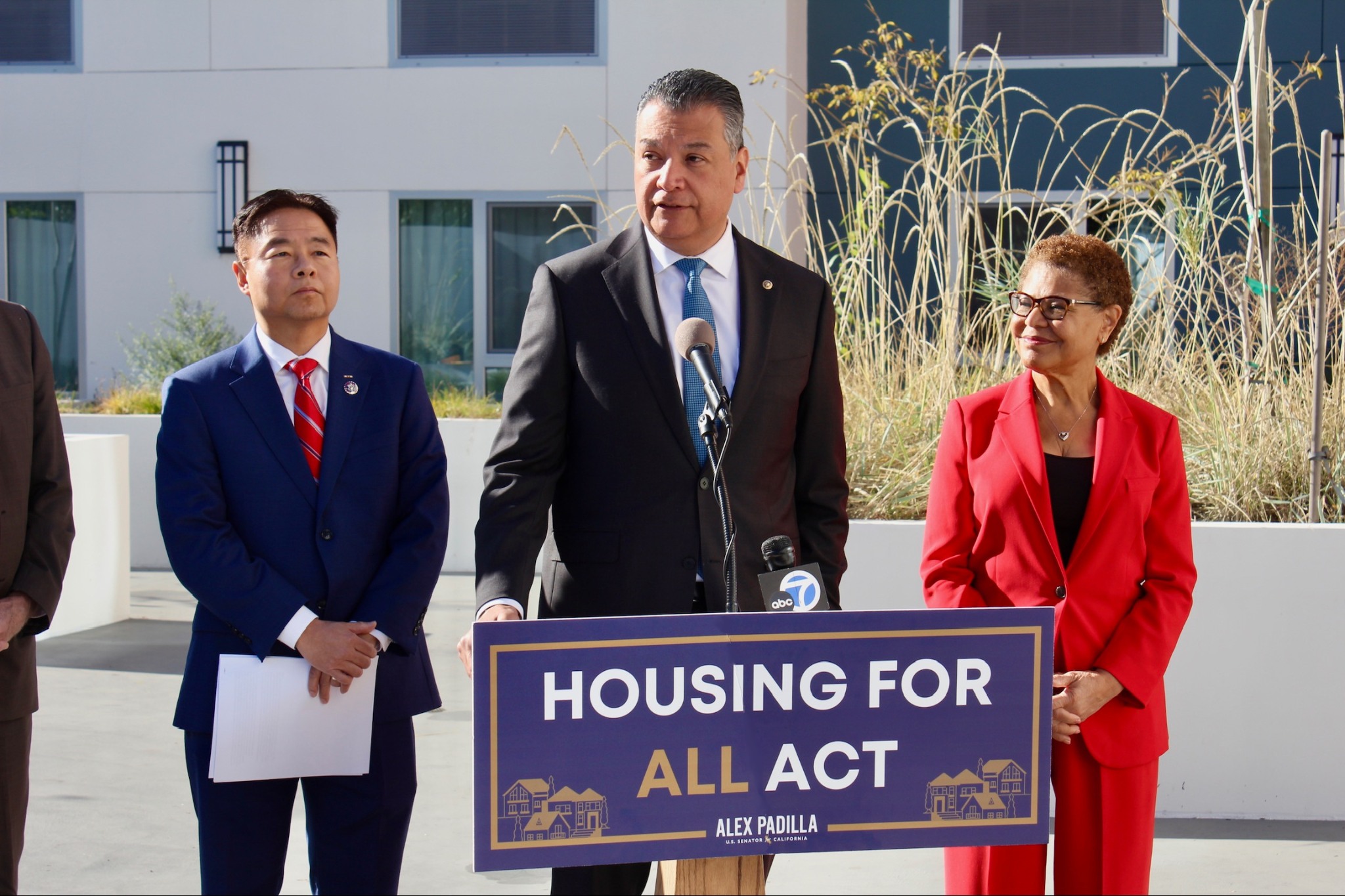At a news conference in Los Angeles, Sen. Alex Padilla announced Wednesday the reintroduction of the Housing for All Act, which he described as a comprehensive approach to address the homelessness and affordable housing crises across California and the nation.
According to Padilla, D-California, the legislation is intended to invest in “proven solutions” and provide a “historic” level of federal funding for strategic and existing programs to keep people housed. It would also support locally developed solutions to help vulnerable populations experiencing homelessness, he said.
“Housing is a basic human right, not a privilege,” Padilla said. “The lack of affordable housing hurts Americans nationwide and disproportionately affects low-income communities and communities of color.”
Padilla said he reintroduced the Housing for All Act to “finally treat the homelessness and affordable housing crises with the seriousness they deserve — and I won’t stop this fight until every person has a place to call home.”
He made the announcement alongside Reps. Ted Lieu and Salud Carbajal, who also introduced companion legislation in the House of Representatives, during a news conference at a Housing Authority of the City of Los Angeles Project Homekey Site.
Mayor Karen Bass, HACLA President and CEO Douglas Guthrie, Business Consumer Services and Housing Deputy Secretary for Homelessness Dhakshike Wickrema, and California State Association of Counties Executive Committee member Luis Alejo were also in attendance.
Bass said when she served alongside Padilla and Lieu that she was proud to support the Housing for All Act, and she’s ready to do it again.
“This bill invests in federal programs that have a proven track record of saving lives and support local strategies like the city’s Inside Safe initiative that are working to get Angelenos off the streets, into interim housing, and ultimately, into permanent housing.”
According to Padilla’s office, the bill would focus on three aspects, including:
— addressing the affordable housing shortage by investing in the National Housing Trust Fund, the HOME Investment Partnerships program, the Section 202 Supportive Housing for Elderly Program, and the Section 811 Supportive Housing for People with Disabilities;
— addressing the homelessness crisis by investing in Housing Choice Vouchers, Project-Based Rental Assistance, the emergency solutions grant program, which helps with street outreach, rapid re-housing assistance, emergency shelter and homelessness prevention measures, and Continuums of Care; and
— supporting local strategies by investing in hotel and motel conversions to permanent supportive housing with health services, the Eviction Protection Grant Program, which provides legal services to low-income tenants at risk or subject to evictions, mobile crisis intervention teams, RV overnight parking programs and locations, library programs geared toward unhoused individuals and bolstering behavioral health services.
In 2023, the National Low Income Housing Coalition reported that “no state or county exists where a person working 40 hours a week and earning the state or local minimum wage can afford to rent a modest two-bedroom apartment.”
According to the coalition’s report, called Out of Reach, it showed that the average minimum wage earner would need to work 104 hours per week — the equivalent of two and a half full-time jobs — to afford a two-bedroom rental home.
Democratic Sens. Cory Booker of New Jersey, Kirsten Gillibrand of New York, Martin Heinrich of New Mexico, Mazie Hirono of Hawaii, and Edward J. Markey of Massachusetts are co-sponsoring the bill in the Senate.
The Housing for All Act of 2023 has been endorsed by housing organizations and stakeholders, such as National Alliance to End Homelessness, National Low Income Housing Coalition, National Rural Housing Coalition, UnidosUS, US Conference of Mayors, Corporation for Supportive Housing, Covenant House and others.







